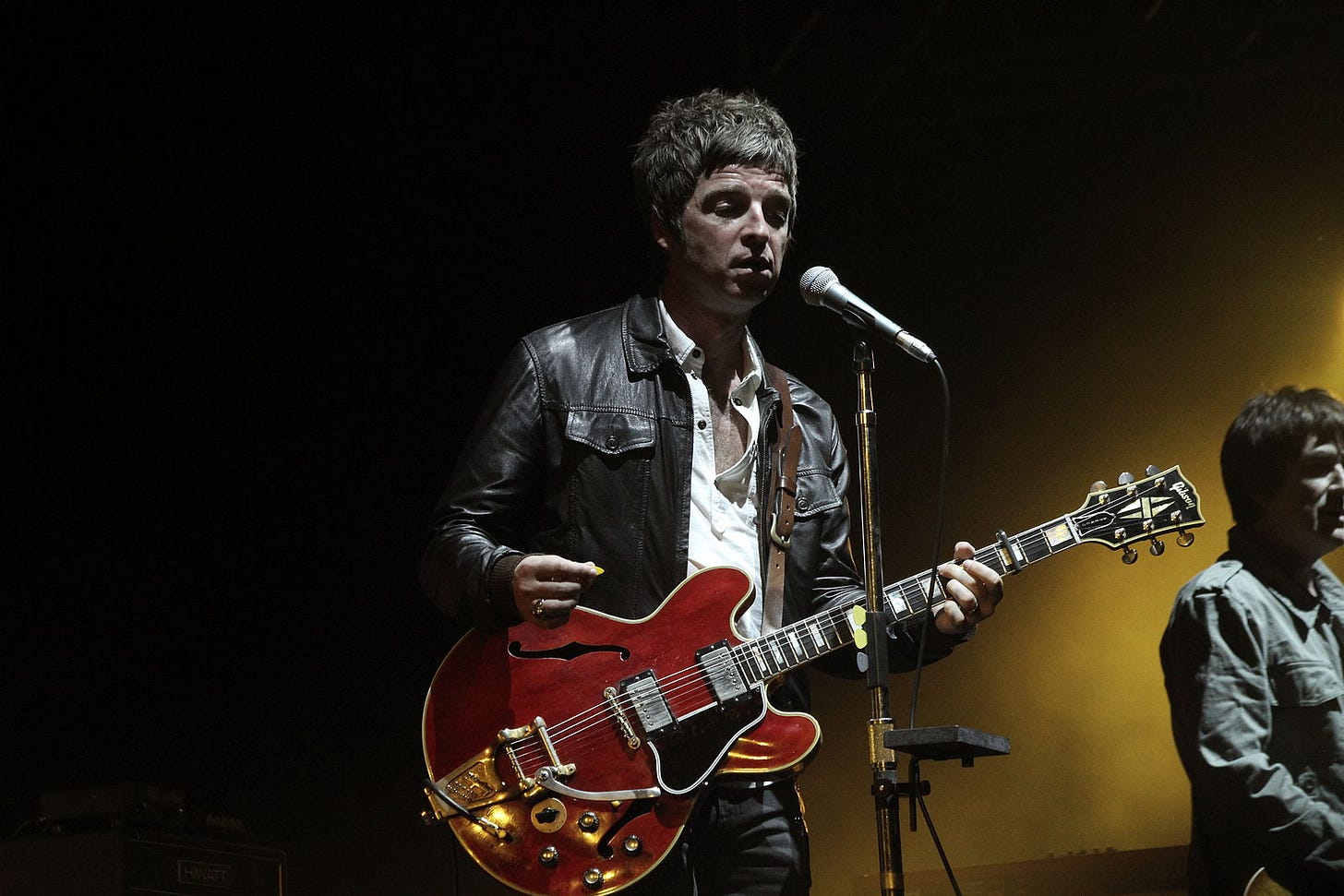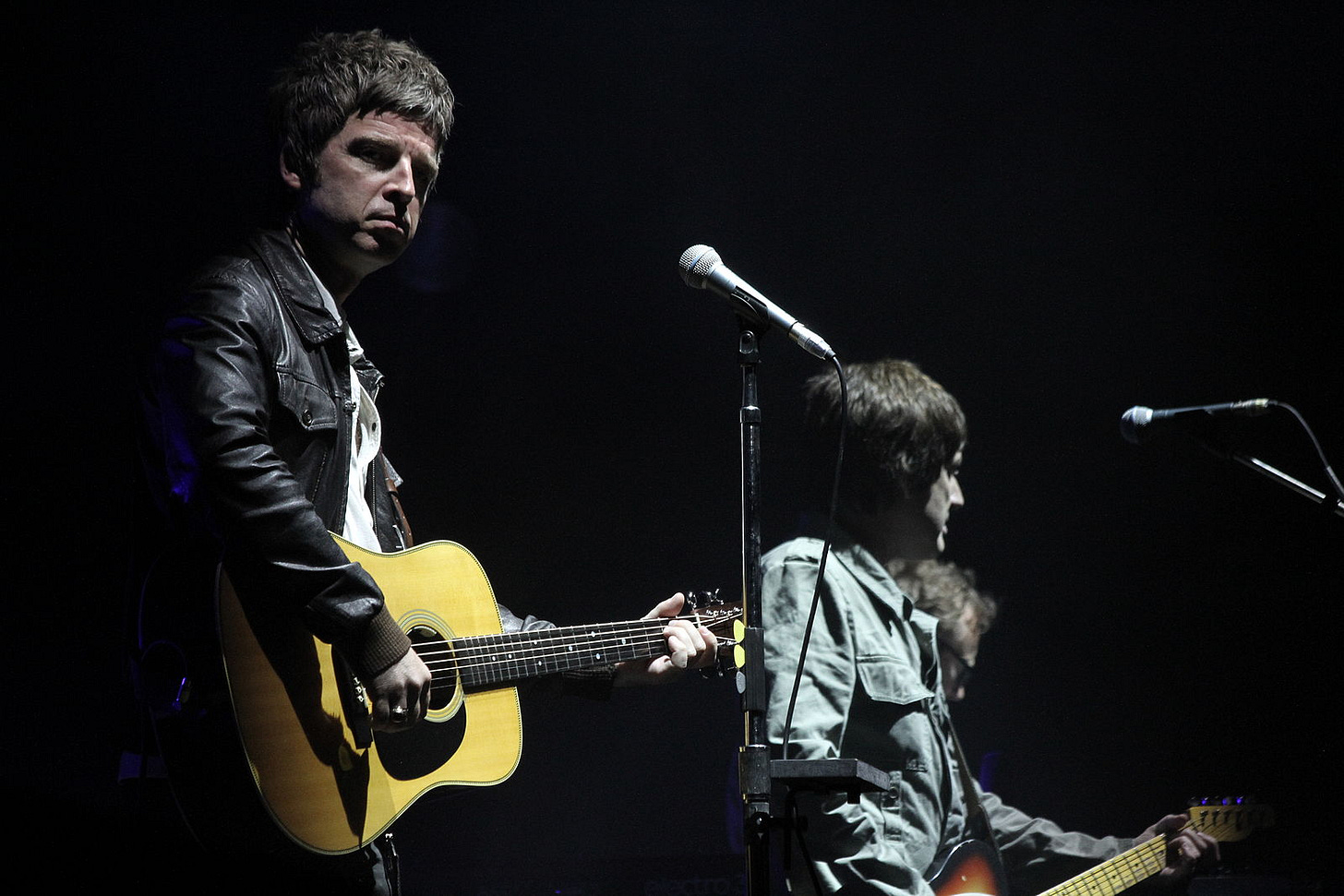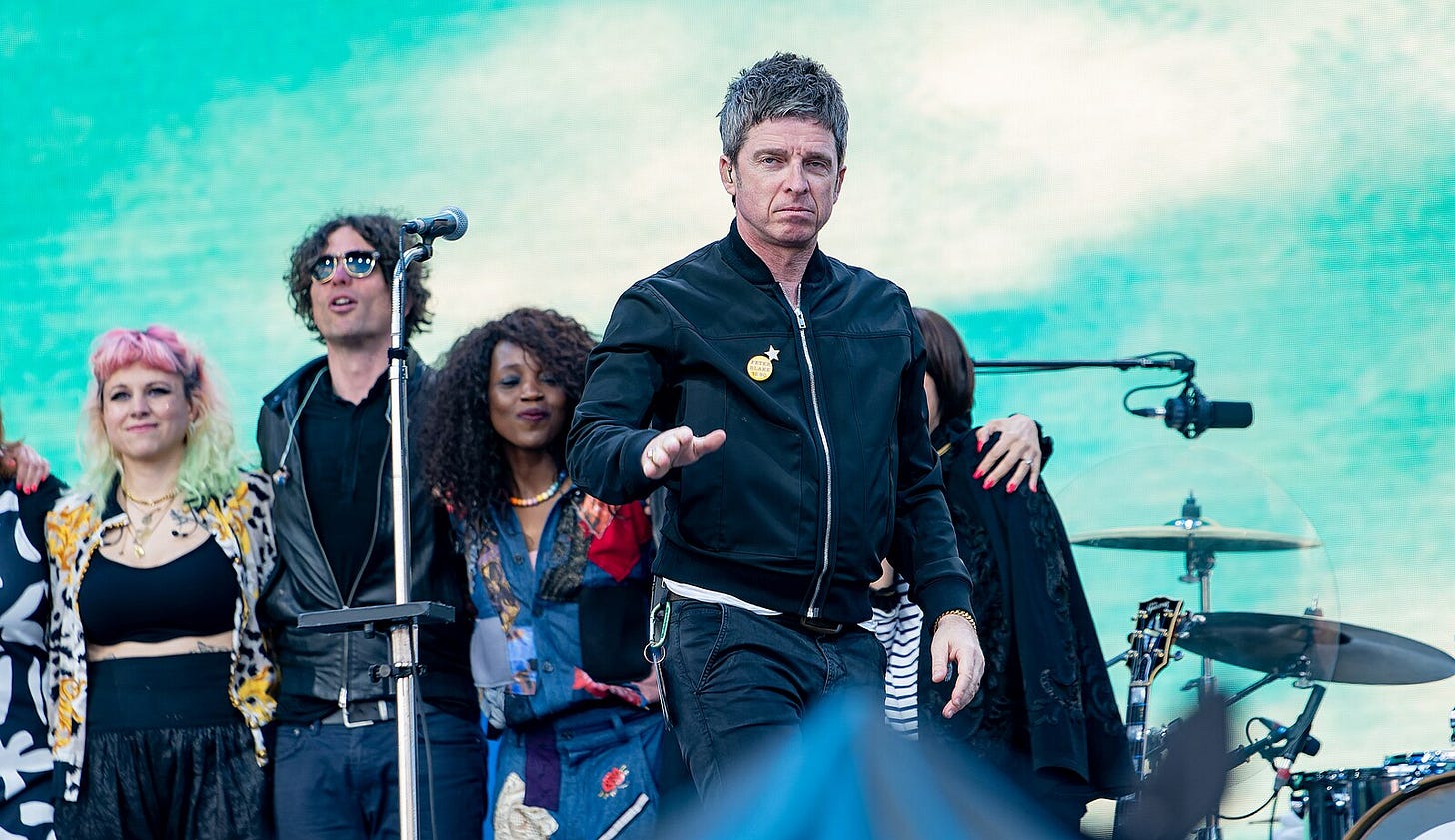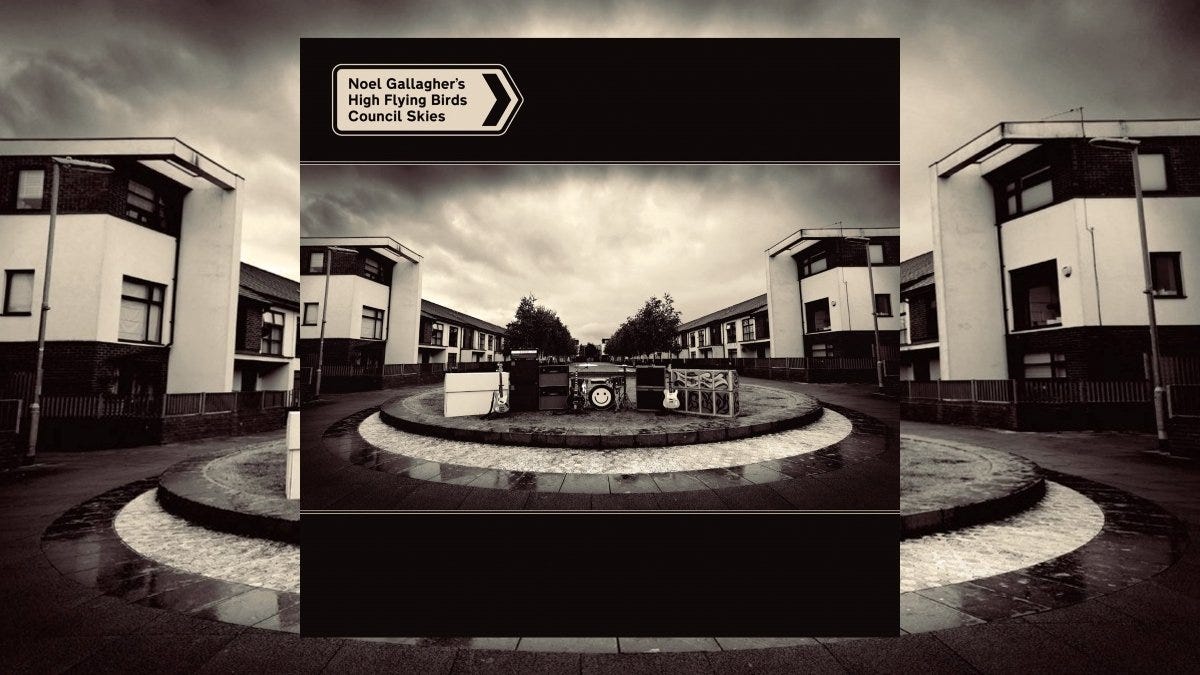Q&A with Noel Gallagher
"What's done is done."
Noel Gallagher has a new album out, and as such has seemed almost omni-present. After being called a “slack-jawed fuckwit” recently by Gallagher, the 1975’s Matty Healy replied: “The difference between me and Noel is that I do a series of interviews to promote an album, whereas he does an album to promote a series of interviews.”
Not bad.
I confess that my interest in the Gallaghers’ solo careers is… modest. I listened to their new stuff, of course, at the time of interviewing them both – but this was a professional obligation. It was amusing to hear Noel speak of his late artistic liberation, and how upsetting the new tunes were to fans of his brother – “parka monkeys” he contemptuously called them. He seemed genuinely thrilled at the prospect of disrupting their expectations, but in reality, Noel’s new stuff sounds a lot like the old – he’s simply discovered the keyboard, and a producer that also makes electronic music. Our Noel is not Bowie – he’s still serving meat and potatoes – but after being breathlessly indulged by the British media for three decades, one’s capacity for self-knowledge might be slightly bent.
Listening to this interview again for the first time since I wrote the profile of the brothers, I was struck by the awkwardness of the beginning. Noel sounded irritable, and seemed to take exception to my less-than-fawning enthusiasm when he perfunctorily asked how I was. Perhaps my inadequate deference prompted his irritability; perhaps an already-existing irritability pounced upon this. Or perhaps I’m entirely wrong.
Who knows. Noel seemed to warm to the interview as it went, only for his defensiveness to erupt petulantly when I asked him about Be Here Now and B-sides. He was careful to couch his criticism abstractly by referring to other interviewers, rather than directly attribute his frustration to me, but there you go.
Anyway, here’s my previously unpublished interview with Noel Gallagher – a complement to the Liam Q&A, and salted with fascinating contradictions. It was recorded in October 2019, about three weeks after I interviewed his brother, and has only been slightly edited for clarity and length. (Part 2 of “Desert Island Discs” will appear as the next instalment of Rickenslacker. Still mulling that one.)

I've noticed that in the last few years, you've mentioned the phrase “universal truths” a lot to describe your lyrics. What are they? What are these universal truths?
Well, as I understand them, they're the things that mean pretty much the same thing to everyone all over the world, you know. People in England get their hearts broken; people in Japan get their hearts broken. People in Australia have loved and lost; people in Africa have loved and lost. I mean, these human truths of life. You know, we all yearn to better ourselves, and we're all products of our surroundings. I guess what I'm trying to say, is that my songs are not really me. I'm not picking the scabs off my life, right? I still pretty much think I’m a child of the universe, and the universal truths are the things that mean the most to me.
I'm sure you’ll disagree, but “Gas Panic” for me has some of your best lyrics. And that’s a case of you writing explicitly autobiographically. But you're saying you don't usually do that?
Well, there are certain lines in certain songs that are really personal to me, but I'm not the kind of artist that would shine a light on that. There are actually a great deal of songs, or lines, that are completely personal to me, but I wouldn't point them out to you – or anybody else, for that matter – because then it would spoil it, you know what I mean? In this day and age of everybody fucking having this disease of sharing everything with everyone all the time, I am absolutely not interested in anybody having the faintest idea of who I am. I couldn't care less. Whatever people read about me on the internet, or any of that shit, I can live with that – I'm not going to go out of my way to change that. I'm a private person. But I am aware of the universal truths that belong to all of us. And I find it easy to write about that, you know, relationships and the journey of life. Life and death is easy for me to write about, because it affects us all. And my songs, even going back to Oasis days, are all inclusive. They involved us all. I was never one to write about “me”, or “I”, it was all about “we” and “us”, which is why Oasis was so popular, because it was inclusive.
Were you conscious of that at the time?
No, no, no, not at all. I was writing on instinct and from the heart. It was only when, I guess around the time of Standing on the Shoulder of Giants, which actually, even if the tunes aren’t great, they’re some of my best lyrics, because they've come out of drug addiction, and I was on the way to getting divorced. And I was writing about that. And I felt strangely unfulfilled after it. I felt like I'd given something away, and I would never get anything back to redress the balance. And I felt better, trying to tell people, or trying to write things, that said more about their lives than it said about mine. I felt more fulfilled doing that than me saying “Oh, you know, this is what I'm going through”. Most artists aren’t like that, but that's just the way I am, I’m afraid.
I agree that our culture of confession can at times be undignified, but—
It's a disease. The world has succumbed to this disease. Everybody is willing to share, aggressively, everything about themselves. And the people that receive this stuff that has been shared are willingly, aggressively, going out of their way to be fucking offended by that. We're in a vicious cycle of people blurting out fucking everything that comes into their heads, and on the other side [are] people being offended by the minutia of fucking bullshit that's in people's brains. And the world is slowly going to eat itself, I think.
There’s a quote of yours that I once read, but the lines aren't lyrics. You said something like, “Once you've been beaten to the ground by your father, and you know you're not going to die, then you're not afraid of anything”. And I accept that when you wrote the lyrics to Standing on the Shoulder of Giants, you felt empty and you told yourself “never again”. But it's difficult, right? Because as undignified as much confession is, it can also be the source of artistic power.
Well, I don't mind discussing it in interviews. I think that's where it's more powerful. To put it into a song? Nah, that's not for me. Music and art is escapism. Now, there's many levels to art, and many artistic fucking endeavours and all that. But for me, the art and the music and the theatre – everything that I'm drawn to – is pretty much 99% escapism. I’ll fucking watch the news myself, thank you very much. I don't want to know what's going on in the world. I want to know how cosmic life could be, you know? I don't need to write songs about how shit my childhood was, but I’ll willingly speak about it in interviews, if I'm in the mood, because it's more powerful then. Because you're saying the words instead of trying to hang it around a song. For instance, I'm probably the opposite to John Lennon, who was only too willing to write songs about how he lost his mother—
He was nakedly confessional, wasn’t he?
Yeah, yeah, but that's not me. The music that I listen to is pop music. Which, you know, means fuck all – but it means everything to me. So, I’ll willingly discuss my childhood in an interview as best I can, but I wouldn't put it into a song.
Can I ask you about fame? I’m thinking about the outrageous success of Oasis. One in three British households had one of your records. The Knebworth concerts were a phenomenon. You guys gave the impression that you weren't just comfortable with fame, but that it was a destiny fulfilled. Was that true? Privately, what was that fame doing to you?
I think it affected the people around us more. Because I was the writer… when Definitely Maybe came out, and everyone was sucking each other's dicks about how fucking great we all were, I knew what was coming with Morning Glory, because I was writing it then. I knew. So I was a lot more prepared than everybody else, and I was thinking: “Well, if you think ‘Live Forever’ is good, wait until you hear ‘Don’t Look Back in Anger’”. You know what I mean? So, I was kind of bracing myself for what was about to come. Everybody else was listening to “Wonderwall” for the first time and fucking going straight down to the estate agents, you know, [wanting to] buy a new house.
So, it didn't really affect me at all. It affected the people around me massively. Oasis, in its first incarnation, never recovered from fame. Bonehead [the original rhythm guitarist] and Guigsy [original bassist] left immediately after ’97. A lot of people around us lost their minds. I always luckily, and thank fucking god, had the work, [which] was an anchor in a sea of madness. Still to this day, I have carried the golden rule: I work backwards from the work. As long as I'm doing the work, I can justify anything to myself. If I'm not taking the work for granted, then I can go and buy a fur coat and a fucking plane and a chimp and a fucking Rolls Royce if I want, because I've worked for it. Right? I can be a drug addict, because I’ve worked for it, yeah?
But if I'm a bass player, and I'm sitting around all day waiting for someone to put the fucking songs in front of me, I don’t know how I’d feel about that. My shield was always the work. And when things were going great, I never had any time off. And then when the perception of Oasis turned in the late ‘90s, early 2000s, it was even more of a shield, because I could work my way through it, you know? The rest of the band were standing around with their hands in their pockets, multi-millionaires all of them, but they’ve got fuck all to do – so, they end up turning into cunts. But I always had to work.
So you think that the idleness was a kind of curse for them?
Well, even that's a universal truth: The devil will find work for idle hands to do, d’you know what I mean? I can’t perceive it from any other position. I've only ever been in one band. I was only ever the leader of that band. I was only ever the writer. That's all I ever was, you know, I didn't work my way up from that. That's what I did. And that's what I've continued to do. You know what I mean? And then towards the end of Oasis, when it was starting to be counterproductive, and all the chaos – chaos is great when you're in your 20s, but when you're getting into your fucking 40s and you're still behaving like people in their 20s, then it's time to move on. And I took the work with me.
When I went solo, people around me were holding their breath. I was thinking: “Why?” Don't be nervous for me. If my songs are good enough, I'll be fine. If they're not, I'll fucking write some more. It's easy. But I guess when management and record labels watch you walk away from a big cash cow, they think “What the fuck is he doing?” But, you know, that’s who I am.

It’s wonderful that your work ethic kept you grounded during a fame that destabilises a lot of people. You spoke about Amy Winehouse recently, and the dangers of fame that she experienced—
It smashed that girl to pieces. She could not fucking deal with it. Because she wasn't a sole writer, she relied on other people. She was writing, of course, but she was a co-writer. Whereas I could always lock myself in a room, and it was just me and a guitar. Not even a fucking tape recorder. Just me and a guitar. And while the storm was going on outside, I was always working my way through it. But back to your point.
No, that's interesting. Liam told me a few weeks ago that his identity was threatened a little when Oasis split up. I wonder if it wasn't different for you. You were the centre of it, the backbone of it. And maybe your identity or creative purpose was harmed by continuing to be in the band. Does that make any sense?
I can understand [that] from his perspective, which is why he's doing the nostalgia thing now, and carried on doing the Oasis thing. Everyone's got to make a living, and a nice one. But my identity has been damaged by him. For me personally, I've got absolutely one-hundred-and-fifty-fucking-percent faith in my own ability, my own talent, and in the people around me. I'm very, very calm in the eye of a storm. Even now, doing the music that I'm doing, his fans are up in arms. And I'm sitting there thinking, “Wow” because if you don't like what I'm doing now, then you're gonna fucking hate what I'm doing next year. And I'm prepared. When I'm going in the studio, and I'm writing “Black Star Dancing” or whatever, you know, I'm not so much of an arrogant fucking idiot to think that everyone's gonna like this. I'm thinking: “This is gonna split the fan base, and I'm ready for it”. I mean, I'm ready for it.
[Producer] David Holmes has challenged you.
Yeah. In an artistic sense, you can’t be in a better place. And eventually, the artist always comes out on top. Because once you're free, you're free. And that's it. And it took [his third solo album] Who Built the Moon, and all that went with it, to be free. And I realised that it's not about changing musical styles. That's easy. I could write a reggae album fucking now. This afternoon. It's changing your mindset is the key. And that's difficult to get out of a mindset of always picking up the same guitar for twenty-five-fucking-years, and then someone saying, “Why are you always playing that guitar? Why not fucking play the keyboard?” And I’m like: “Well, I can't play the keyboard.” It's like, “Great. Play the fucking keyboard”. And now, when I'm in the studio, or ideas are coming for songs, the electric guitar is the last thing on my mind. So, it's a change to your mindset.
But my reputation… I feel like it’s turned [badly] over the last couple of years. And that's because of Liam. And that's fine. If that's the way he wants to fucking conduct himself, then fine. But again, it's the work that always keeps me in the game. Always.
Can I go back to your work ethic, drive, your purpose – and it keeping you grounded. Can I suggest that there was this minor tragedy to your career, which was that you kept writing these phenomenal songs and gifting them as B-sides. It seems like some of your own favourite songs aren’t on any Oasis album, like “The Masterplan” and “Acquiesce”. What would be the ideal track-listing for [third Oasis album] Be Here Now?
Well, the B-sides album The Masterplan should have been Be Here Now, and Be Here Now should have been a bunch of B-sides. But how that came about was, Morning Glory was blowing up and the singles market then was fucking insane – four B-sides to a fucking single. I was always being phoned on the road: “We need two more songs”. And so, I’d go away and write two songs, and they’d be “Talk Tonight” and “The Masterplan”.
The way that we ran our business then with Creation [Records], somebody should have been fucking bright enough to stand up and say: “You can't fucking put these out as B-sides, you’re fucking mental”. But you’re just in the moment. [You] record it and put it out.
But saying that, though those songs aren’t as well known, they’ve sustained my live career ever since. Because they’re songs that you have to discover. They're not universally known songs. But they’re still out there. I mean, to be honest, I get that all the time. When I put out fucking singles, people always say, “Oh, the B-side should have been the single” and I’m like “What the fuck has it got to do with you, anyway? Why don't you start your own fucking band?”
Anyway, yes, The Masterplan would have been the perfect third album. But what's done is done. And it's the one major regret I have in my professional life is I wasn't aware enough. I was on drugs at the time. But at that time, I didn’t write shit songs. I never wrote B-sides. Every song I wrote for about three years was a classic. Everything. So, you go with it. You never know when it’s going to dry up, or level off. What’s going to happen in five years, ten years. I’m living in the moment. It’s just another song. But as time goes on, these songs are elevated into iconic status. But the songs are still around. That's the beauty of it.
I guess for me the significance of it is that, 1) you regret it, and 2) it suggests that you didn't have wise counsel around you. And the mix alone of Be Here Now suggests there wasn't wise counsel around you. Were the people around you, and the record label, were they too cynical? Too eager to get out a new record? And who did you go to for counsel? Did you have anyone? Or did you just take your own counsel?
I learned a lesson pretty quickly after Be Here Now, which was we can't have guys working for us. By “guys”, I mean “men”. If we have men working for us, they automatically think that they are us. So, if we're all fucking doing loads of coke and fucking acid, they start doing it because they think it’s a great thing. And after that, we need to get women working for us, because then we don't have to hang out with them. I'm looking around my office now, and there's like 20 people in this office, and 17 of them are female.
[Sound engineer] Owen Morris, bless him, he was like one of the band. When we were doing drugs in the studio, he was doing drugs in the studio. He mixed the record with me, and we were fucking doing loads of cocaine. All day, every day. And Creation Records never came to the studio, you just put [the finished album] on the desk in front of them. And everybody always went “It’s fucking amazing”. When I delivered Be Here Now – and this is the truth – I thought [the songs were] pretty fucking good. Not great, but good. But when I played it to everybody else, you know what they said? “This is fucking amazing”. Alan McGee, all of Sony. So then you’re thinking, “Really? Well, they must be.” But here’s another truth that I learnt: After about a week of touring it, the people just weren’t moved by it.
A crowd can’t lie, can it?
Yeah. You can play a song in front of eight people in a room, and they get all self-conscious and say it’s great. But play to 50,000 people, and 30,000 of them are not into it, you work it out. Suddenly, on tour I realised that the songs are fucking too long, the lyrics are shit, and the arrangements were all over the place. But it was too late then. We soldiered on through that tour, and it was the best tour of my life. We had the best time. And then we closed that chapter.

I’m told that I don’t have long, Noel. So, last question: You once said that you were trying to rewrite (What's the Story) Morning Glory? for 16 years, and I was curious about you being captive to the success of that record.
Well, when you're playing stadiums, you tend to write stadium rock. That’s it, in a nutshell. Once you don't play stadiums anymore, you can be more considered about what you do. If you've only ever worked in one way, and you just carry on doing that, you're just going around in ever-decreasing circles. At some point, you have to have the balls to put it fucking back on the line and say, you know, I'm going to do something different.
And risk derision and failure.
Absolutely. You've got to be prepared to fail. You've got to be prepared to be fucking laughed at. You’ve got to be prepared to be derided. You've got to be prepared for bad reviews. But it's like, “What are you? Are you a fucking artist, or are you just a fucking tribute act?” And, you know, it took me 26 or 27 years to accept that I was an artist.


